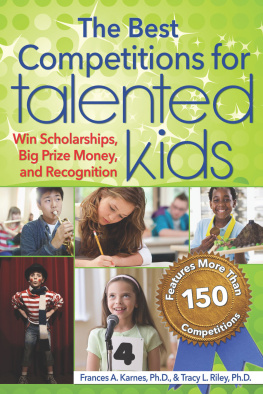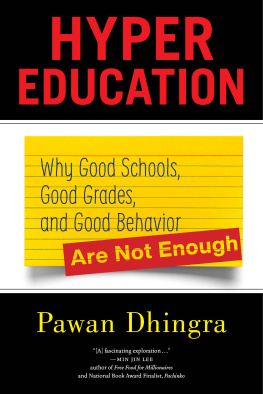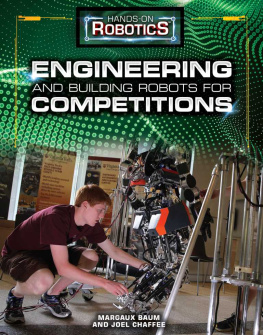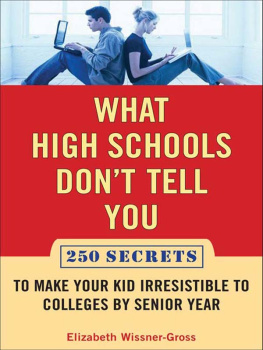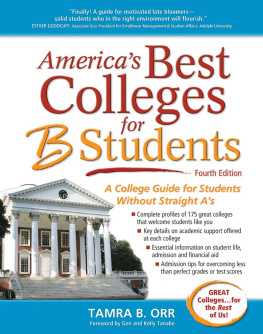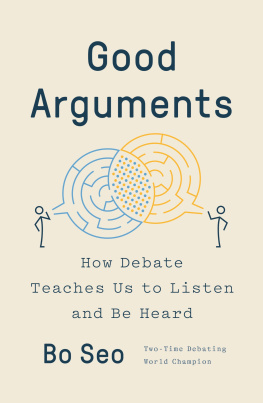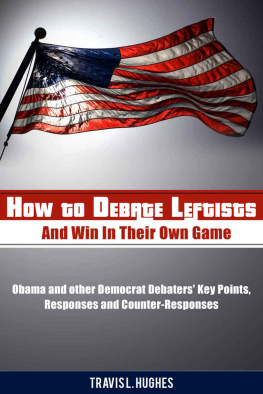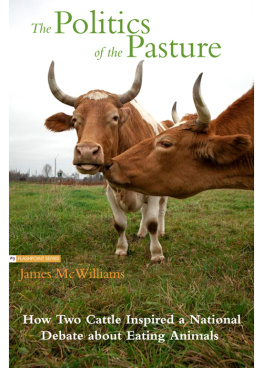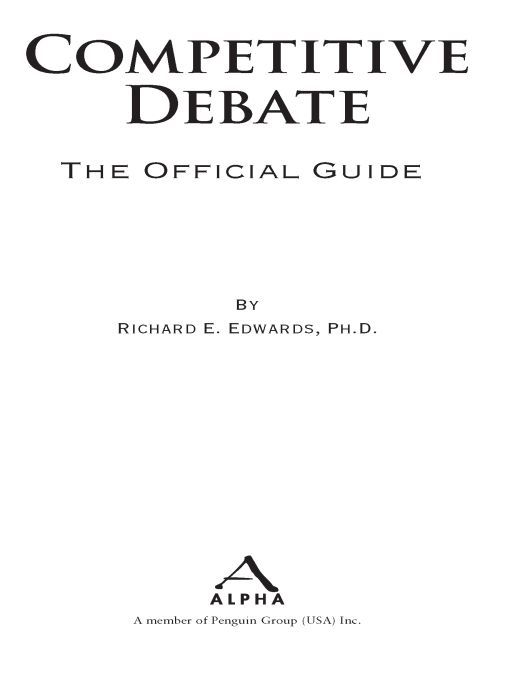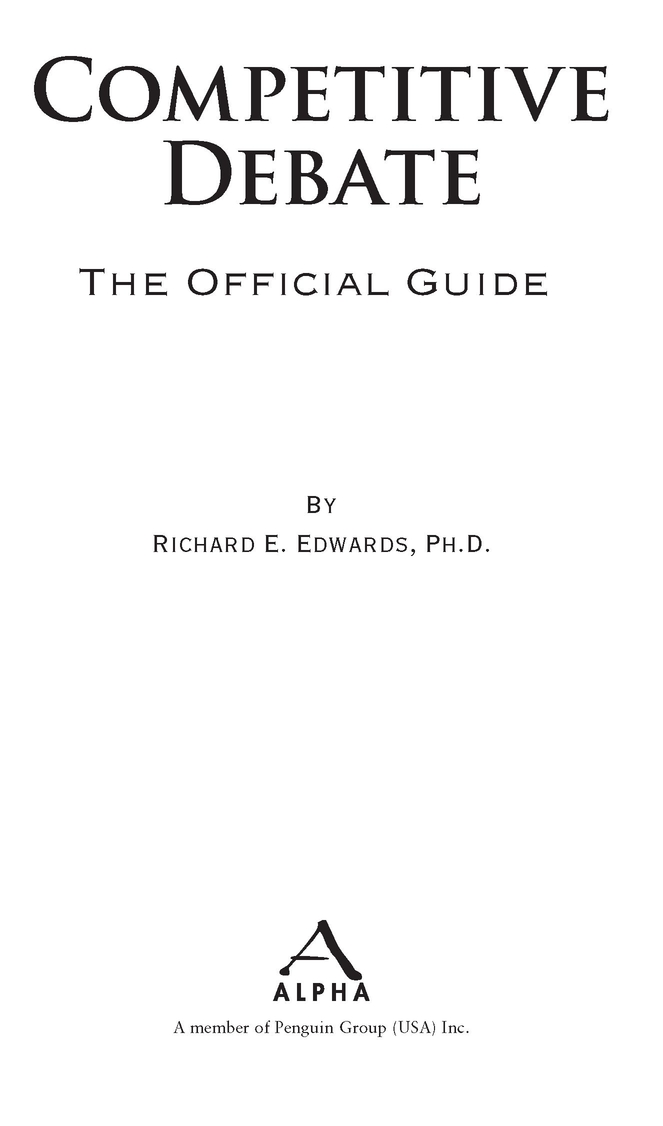Table of Contents
ACKNOWLEDGMENTS
My love for competitive debate began as the result of an outstanding high school debate coachFrank Kruse at Newton Senior High School in Newton, Iowa. Frank Kruse was one of those teachers who dramatically changed the lives of his students for the betterI can with certainty say that happened in my case. Robert Kemp was my teacher, colleague, and friend during the eight years I spent as a debater and graduate student at the University of Iowa. I dedicate this book to Frank Kruse and Bob Kemp, the debate coaches who introduced me to the life of the mind.
I am grateful to the participants in the national final debates in 2006 and 2007 for agreeing to the publication of their speeches in this volume. The 2006 public forum debate finalists were Valerie Hobbs/Michelle Schmit from Bishop Heelan High School in Sioux City, Iowa (coached by Elizabeth Dalton), and David Nadle/Jennifer Goldstein from Marjory Stoneman Douglas High School in Parkland, Florida (coached by Diane McCormick). The 2007 Lincoln-Douglas debate finalists were Taarini Vohra of The Hockaday School in Dallas, Texas (coached by Stacy Thomas), and Bilal Malik of James Logan High School in Union City, California (coached by Tommie Lindsay, Jr.). The 2007 policy debate finalists were Andrew Baker/Sarah Weiner of Shawnee Mission West High School in Shawnee Mission, Kansas (coached by Ken King), and Stephanie Spies/Matt Fisher of Glenbrook North High School in Northbrook, Illinois (coached by Christina Tallungan).
I am indebted to Tim Averill, the debate coach at the Waring School in Beverly, Massachusetts, who was willing to share his extensive teaching resources for the coaching of public forum debate. Scott Wunn, Executive Director of the National Forensic League, and Kent Summers, Associate Director of the National Federation of State High School Associations, also provided essential resource materials.
Finally, I appreciate the assistance and encouragement of my wife Connie, the love of my life.
TRADEMARKS
All terms mentioned in this book that are known to be or are suspected of being trademarks or service marks have been appropriately capitalized. Alpha Books and Penguin Group (USA) Inc. cannot attest to the accuracy of this information. Use of a term in this book should not be regarded as affecting the validity of any trademark or service mark.
CHAPTER 1
THE VALUE OF DEBATE
If you have chosen to read this book, you no doubt enjoy a good argument! But competitive debate means more than arguing with a friend about whether video games cause violence or some other subject of interest. In an organized system now almost a century old, thousands of American high schools and middle schools offer opportunities to participate in debate tournaments. Homeschool debate leagues also now sponsor debate tournaments. In these tournaments, students present and defend pre-prepared arguments in competition with the opposing arguments from another school or league. The topics for these competitions are selected by national organizations, meaning that students throughout the United States are debating the same topics. Each debate round is judged by experienced critics who have the responsibility to declare a winner and a loser. Debate tournaments produce regional, state, and national champions in each style of debate.
This first chapter discusses the benefits of competitive debate. These benefits have been shared by hundreds of thousands of students who have participated in debate, not simply the smaller group of state and national champions.
DEBATE MAKES LEARNING FUN!
Debate competition turns learning into an exciting game. Unlike some other academic games, winners are not those who have memorized the greatest number of facts. Debate competition introduces its participants to a much broader world of ideas. Successful debaters are able to articulate why something is true, uncovering sometimes hidden value assumptions.
The search for the why comes naturally to the human spirit. Normal three- or four-year-old children go through a phase of asking why? to every statement made by their parents. The parents soon discover that every answer or explanation will still be met with why? Ultimately, the adults end the game with I dont know or because I said so. Some children grow tired of inquiry and simply accept the statements of others as inscrutable truth. Yet for most of us, the search for the why never ends. If the question is gun control, it isnt enough to know that a prominent senator supports it; we want to know more.
CRITICAL THINKING
Critical thinking does not mean to be critical of others or to think negatively. Instead, it refers to an ability to arrive at decisions through a systematic and logical process. Dr. Raymond S. Nickerson, professor of psychology at Tufts University, has listed numerous characteristics of the critical thinker, including the following:
Uses evidence skillfully and impartially
Organizes thoughts and articulates them concisely and coherently
Distinguishes between logically valid and invalid inferences
Can learn independently and has an abiding interest in doing so
Can strip a verbal argument of irrelevancies and phrase it in its essential terms
Habitually questions ones own views and attempts to understand both the assumptions that are critical to those views and the implications of the views (Schafersman)
Competitive debate promotes all six of these elements as it pits argument against argument; through a process of trial and error, debaters learn the difference between strong and weak arguments. Ironically, many beginning debaters win every round of debate from their perspectives, their arguments were vastly superior to their opponents. No matter that the judge awarded the win to their opponents. With more experience, however, debaters develop the ability to recognize when they have lost. Learning to recognize the strength of an opposing argument plays a major role in the cultivation of critical thinking skills.
LOVE FOR LEARNING
Too much of the educational process in contemporary American education involves teachers telling students what to think. Thus education becomes a dull process of memorizing mountains of facts. Competitive debate takes a different approach: it teaches students how to think. The thought process begins by gathering evidence with an open mind.
Most forms of competitive debate involve the switching of sides. Suppose that the national debate question is Resolved: The United States federal government should regulate handguns. Switching sides means that a debater will be called upon to advocate gun control in one round and to oppose it in the very next round. In the later rounds of a tournament, debaters toss a coin to determine whether they will support or oppose the debate resolution.
Switching sides produces numerous benefits. Prominent among these benefits is the ability to understand the arguments of an opponent. All of us have a tendency to underestimate our opposition until we have truly considered the strength of the evidence supporting their position. Competitive debate provides students a safe space for the testing of ideas.
RESEARCH SKILLS
Debate teaches cutting-edge research skills. Because the quality of an argument often depends on the strength of the supporting evidence, debaters quickly learn to find the best evidence. This means going beyond run-of-the-mill Internet sources to government hearings, law reviews, professional journal articles, and book-length treatments of subjects. Debaters learn how to evaluate study methodology and source credibility.


